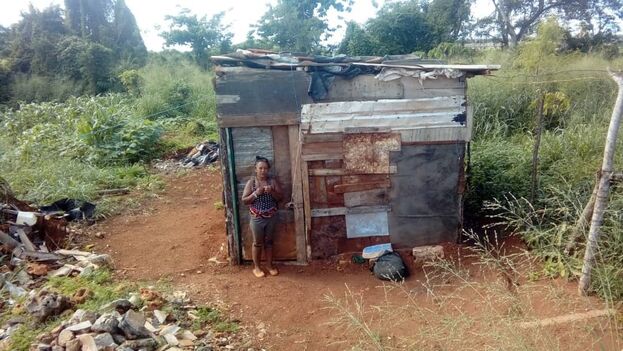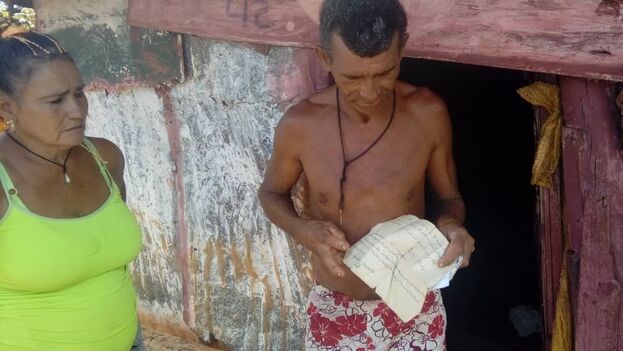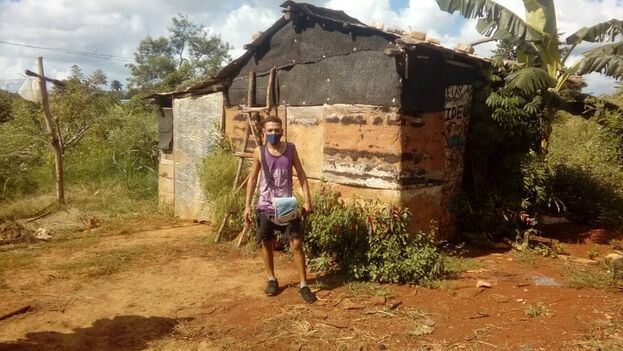
![]() 14ymedio, Serafín Martínez, Havana, 18 November 2020 — “My husband and I built my little wooden house with dirt floors and inspectors immediately arrived. I paid two fines of 500 pesos and another of 2,000 pesos, doubled, for illegal occupation of the land. But I did not leave.” This is how Kirenia Alganza Torres recounts her first encounter with the authorities in Los Quimbos, a marginal community in the municipality of Alquízar (Artemisa).
14ymedio, Serafín Martínez, Havana, 18 November 2020 — “My husband and I built my little wooden house with dirt floors and inspectors immediately arrived. I paid two fines of 500 pesos and another of 2,000 pesos, doubled, for illegal occupation of the land. But I did not leave.” This is how Kirenia Alganza Torres recounts her first encounter with the authorities in Los Quimbos, a marginal community in the municipality of Alquízar (Artemisa).
Several years went by until, on November 9th, the authorities returned to remove the neighbors from their homes. “They told us that we were illegal and that this land belongs to the Alquitex factory, which needs it. Overall, I don’t know what they want it for, because the factory has been closed and idle for a long time and I won’t leave until they give me a house or legal land I can build on,” says this 39-year-old woman who has five minor children and works as a cleaning assistant at a school in the area.
Kirenia is one of the founders of Los Quimbos. “I had been treated for several years as a mental case, even for suicide attempts due to my critical housing situation. It was all for naught, until I decided to come here, as soon as I found out that people were building here,” she says.

In the first eviction attempt, they took 26 of the original settlers of the Mirtha Farm, but they still have no electricity or water. “At least I got the electricity from an overhead line,” she adds.
This community was built spontaneously, starting in 2005, by migrants from the eastern provinces, especially Guantánamo. They began to settle illegally in lands surrounding the textile factory known as Alquitex, officially named “Rubén Martínez Villena,”,attached to the Ducal Textile Company of the Light Industry Business Group.
They named it the same as the precarious houses on the outskirts of Guantánamo, in turn named after the quimbos of Angola, the miserable huts that Cuban soldiers got to know during the military intervention of the African country.
Los Quimbos de Alquízar are made up of around 100 marginal homes where over 500 people live without running water or sewers and many without electricity. The residents also live under permanent siege from the authorities, who have demolished several shacks and heavily fined the residents of the community.

The on-going harassment has not prevented the permanence, the roots and the extension of the community due to the lack of housing.
“I’m not leaving here because I have nowhere to go,” says Idelfonso Rodríguez, a 27-year-old rickshaw driver, who states: “Since I built my little house, the inspectors arrived and ate me alive with fines: 500 pesos for misappropriation of the land, 1,000 pesos for not demolishing and 300 pesos for illegally connecting to the electricity. I have not been able to pay the fines. I don’t have a ration card.”
Rosaida, 50, came from the Oriente province four months ago because of a marriage that soon ended, and she was left alone, on the street and unable to legalize her change of address. “I was desperate. I couldn’t go back, so I built my little house, made of wood, cardboard, and dirt floor. I don’t have water and now I don’t have electricity. I do my necessities outside on the patio when it gets dark. I bring big jugs of drinking and cooking water from far away. I use firewood for cooking and the inspectors cut off the light from the overhead lines. I don’t have a ration card and eat whatever is around,” she says.
The woman swears that the governor of Alquízar, Miguelito Rodríguez, wants to deport her to Oriente, “although on his last visit he put his hand on my shoulder and told me that everything was going to be ok,” she adds. “I suffer from a nervous condition and I don’t have a husband.”

René, 72, is also inflexible: “I am disabled, I’ve had surgery on my leg and I have a rod in it. Still, I work as a custodian at the Zorrilla farm. I live alone and they want to get me out of here. Where to go. This is my house and I’m not leaving here.”
Another disabled person, as a result of a traffic accident that caused paralysis, is Eddy Reyes Frómeta, age 55. He lives on a patch of land adjacent to that of his sister, Mirtha, and they both arrived 17 years ago from Baracoa, Guantánamo. “Two years ago, they knocked down my little ranch, the policemen put me on a bus, they released me with my belongings in some sacks and dumped me off. A few days later I returned and they have not been able to get to me anymore. Every time there’s more of us and they will not be able to get us out of here,” says the man.
His sister Mirtha, who lives with her son, narrates: “On Monday of last week, when the inspectors came to get us out, they put numbers on our houses. I don’t know if that is good or bad. I cannot return to Baracoa. I don’t mess with anyone and I’m not leaving here.”
Translated by Norma Whiting
